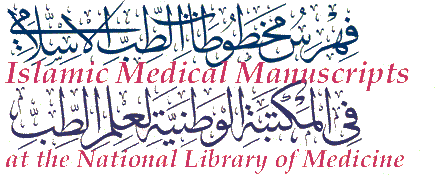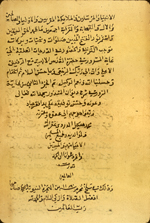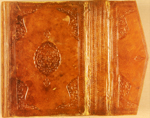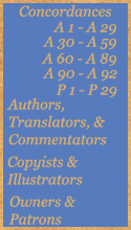Catalogue: Alchemy
‘Izz al-Dīn Aydamir ibn ‘Abd Allāh al-Jaldakī (d. 1342/743)
al-Jaldakī was one of the last and one of the greatest of medieval Islamic alchemists. He was apparently born in Jaldak, a district of Khurasan about 15 kilometers from Mashhad in Iran and spent seventeen years travelling extensively before settling in Egypt where he composed many of his alchemical treatises, of which the National Library of Medicine has three examples.
-
 Ghāyat al-surur fi sharh dīwān Shudhūr al-dhahab (MS A 14)
Ghāyat al-surur fi sharh dīwān Shudhūr al-dhahab (MS A 14) - غياة فى شرح ديوان شذور الذهب
- (The Acme of Pleasure in the Commentary on the Poems 'Nuggets of Gold')
- by ‘Izz al-Dīn Aydamir ibn ‘Abd Allāh al-Jaldakī (d. 1342/743)
- عز الدين ايدمر ابن عبد الله الجلدكى
This is a commentary on an allegorical, alchemical poem, Shudhur al-dhahab (Nuggets of Gold) by Ibn Arfa‘ Ra's, who died in 1197/593. The poem being commented upon was composed of 1460 verses having as rhymes the 28 letters of the Arabic alphabet. Al-Jaldakī states that he wrote this commentary while in Cairo in the year 1341 (742 H).
For other copies of this commentary, see Ullmann, Natur, p. 239 note 2.
NLM also has a copy of another commentary on this same set of poems by Ibn Arfa‘ Ra’s, in this case a commentary by a pupil of Ibn Arfa‘ Ra’s named Abū al-Qāsim Muḥammad ibn ‘Abd Allāh al-Anṣārī (MS A 65, item 1).
Ghāyat al-surur fi sharh dīwān Shudhūr al-dhahab (MS A 14)
Illustrations
The final page of Ghāyat al-surur fi sharh dīwān Shudhūr al-dhahab (The Acme of Pleasure in the Commentary on the Poems 'Nuggets of Gold'), a commentary by al-Jaldakī (d. 1342/743) on an alchemical-allegorical poem by Ibn Arfa‘ Ra’s. According to the colophon shown here the copy was completed at the end (salkh) of the month of Muharram 1180 (= 9 July 1766) , and the copyist was Muḥammad Haykal al-Darawī.
This manuscript is bound in a Persian/Turkish binding of the 18th or 19th century. On each cover there is a central panel stamp of shallow-scalloped ovoid outline with two small pendants. There are also blind-stamped corner panels whose inner field is decorated in the same manner as the central panel, with twisted and tied cloud ribbon forms with vine work studded with flower heads (probably carnations). These deeply-impressed blind stamps are framed by blind-tooled fillets either side of a string of small circles; similar frames decorate the fore-edge flap. The envelope flap is decorated with similar corner panels and frames and one small stamp identical to one of the pendants on the covers.
Physical Description
Arabic. 393 leaves (fols.1a-168b and 171b-395b). Dimensions 21.2 x 14 (text area 15.8 x 8.5) cm; 19 lines per page. The title is given in the text (fol. 168b lines 5-6, and fol. 174a line 17) and in the colophon (fol. 395b line 7). Neither the name of the author of the commentary nor of the poem are given. The commentary is usually ascribed to al-Jaldakī, the poem to Ibn Arfa‘ Ra’s (see Ullmann, Natur, p. 231-2 and 239).
The manuscript is dated the end (salkh) of the month of Muharram 1180 (= 9 July 1766) on fol. 168b and fol. 395b. The copyist is given as Muḥammad Haykal al-Darawī (fol. 168b line 15 and fol. 395b line 11).
The commentary, which includes the collection of poems, is arranged in two parts, fol. 1-168b and fols. 171b-395b, each having a colophon. The beginning of the text is missing; nineteen quires of ten folios each were numbered consecutively in Arabic numerals, and the first two of these quires are now missing from the volume.
The text is written in a medium-small naskh script using a brown-black ink with headings in red and red overlinings. The poem upon which the commentary is based is written in red ink. There are catchwords.
There are some marginalia, mostly emending the text, and some marginal subject headings.
The lightly-glossed paper varies from an ivory to a dark-beige and even brown, all of it having fine vertical laid lines and single chain lines (no watermarks observed). This is some damp-staining and occasional thumbprints and smudges.
The volume consists of 395 leaves. Fols. 169a-171a are blank.
Binding
The volume is bound in brown-leather over pasteboards with envelope flap (Persian/Turkish, 18th or 19th century). On each cover there is a central panel stamp of shallow-scalloped ovoid outline with two small pendants. There are also blind-stamped corner panels whose inner field is decorated in the same manner as the central panel, with twisted and tied cloud ribbon forms with vine work studded with flower heads (probably carnations). These deeply-impressed blind stamps are framed by blind-tooled fillets either side of a string of small circles; similar frames decorate the fore-edge flap. The envelope flap is decorated with similar corner panels and frames and one small stamp identical to one of the pendants on the covers. There are tan-paper pasteboards and envelope flap lining, with a brown leather fore-edge flap lining. There are modern endpapers.
The bound volume is kept in a case made of red leather over thin pasteboards. The box is open at the narrow end where there is a lid that can slip onto the case. A woven ribbon is attached to the inside side of the case, in order that, when properly positioned, it may be pulled to remove the manuscript from the tight-fitting slipcase. The case is decorated on the two wide sides and the lid with paper printed in a repetitive design of circles and leaf-forms in red, yellow, white, and black.
Provenance
The volume was purchased in 1941 by the Army Medical Library from A. S. Yahuda (ELS no. 1692, med. 56.).
References
Schullian/Sommer, Cat. of incun. & MSS., entry A 14, p. 301.
NLM Microfilm Reel: FILM 48-114 no. 4












